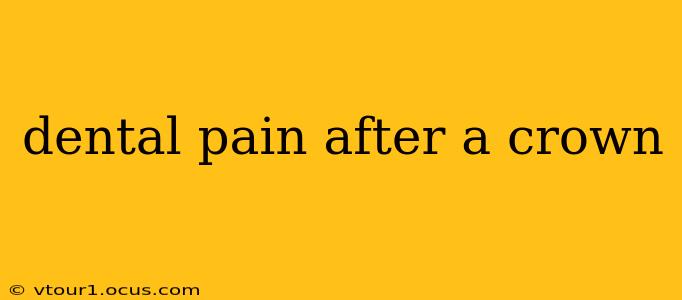Getting a dental crown is a common procedure designed to restore a damaged tooth's strength, shape, and appearance. While crowns are generally successful, some patients experience pain afterward. This post will explore the reasons behind this post-crown discomfort, offering advice on managing the pain and when professional help is crucial.
Why Does My Tooth Hurt After Getting a Crown?
Post-crown pain can stem from several sources. Understanding the potential causes is the first step in addressing the issue.
-
Irritation: The initial irritation from the crown itself is a common cause. Your gums and tooth may be slightly sensitive as they adjust to the new restoration. This usually subsides within a few days.
-
Cement Sensitivity: The cement used to attach the crown can sometimes irritate the pulp (the soft tissue inside your tooth). This can lead to lingering sensitivity, particularly to hot or cold temperatures.
-
Infection: In some instances, an infection may develop under the crown. This can cause throbbing pain, swelling, and even fever. This is a serious complication and requires immediate dental attention.
-
Underlying Tooth Damage: If the underlying tooth wasn't fully treated before the crown placement, existing decay or inflammation could persist and cause pain.
-
Bite Problems: A poorly fitted crown can alter your bite, leading to discomfort in the jaw, teeth, and even headaches. This can manifest as pain in the crowned tooth or adjacent teeth.
-
Sinus Issues: Pain in the upper molars can sometimes be related to sinus problems, especially if the pain is accompanied by other sinus symptoms. This is less directly related to the crown itself but can cause confusion.
What Can I Do About the Pain?
Mild post-crown discomfort is usually manageable at home. Try these remedies:
-
Over-the-counter pain relievers: Ibuprofen or acetaminophen can help reduce inflammation and pain. Always follow the dosage instructions on the packaging.
-
Saltwater rinses: Gently rinsing your mouth with warm salt water several times a day can help soothe irritated gums.
-
Cold compresses: Applying a cold compress to your cheek can help reduce swelling and numb the area.
-
Avoid hard foods: For the first few days, stick to soft foods to avoid putting pressure on the crown.
Is the Pain After My Crown Normal? How Long Should It Last?
While some mild discomfort is expected, persistent or severe pain is not normal. The pain should generally subside within a few days. If the pain intensifies, changes in character (e.g., from dull ache to sharp throbbing), or is accompanied by other symptoms (swelling, fever), seek professional dental care immediately.
When Should I Call My Dentist About Post-Crown Pain?
Contact your dentist immediately if you experience any of the following:
-
Severe or persistent pain: Pain that doesn't improve after a few days or worsens.
-
Swelling or inflammation: Noticeable swelling in your gums or jaw.
-
Fever: A high temperature accompanied by dental pain.
-
Sensitivity to biting: Difficulty or pain when biting down.
-
Loose crown: If you feel the crown is becoming loose or shifting.
How Can I Prevent Pain After Getting a Crown?
Following your dentist's post-procedure instructions is crucial. This usually includes advice on diet, oral hygiene, and pain management. Choosing a reputable dentist with experience placing crowns also contributes significantly to a smoother recovery process.
Can a poorly fitted crown cause pain?
Yes, a poorly fitted crown can definitely cause pain. If the crown doesn't fit correctly, it can cause pressure on your gums and teeth, leading to discomfort, sensitivity, and even damage to the surrounding teeth and jaw. This highlights the importance of choosing an experienced dentist who ensures proper fit and function.
This information is for general knowledge and does not constitute medical advice. Always consult with a qualified dental professional for diagnosis and treatment of any dental concerns.
